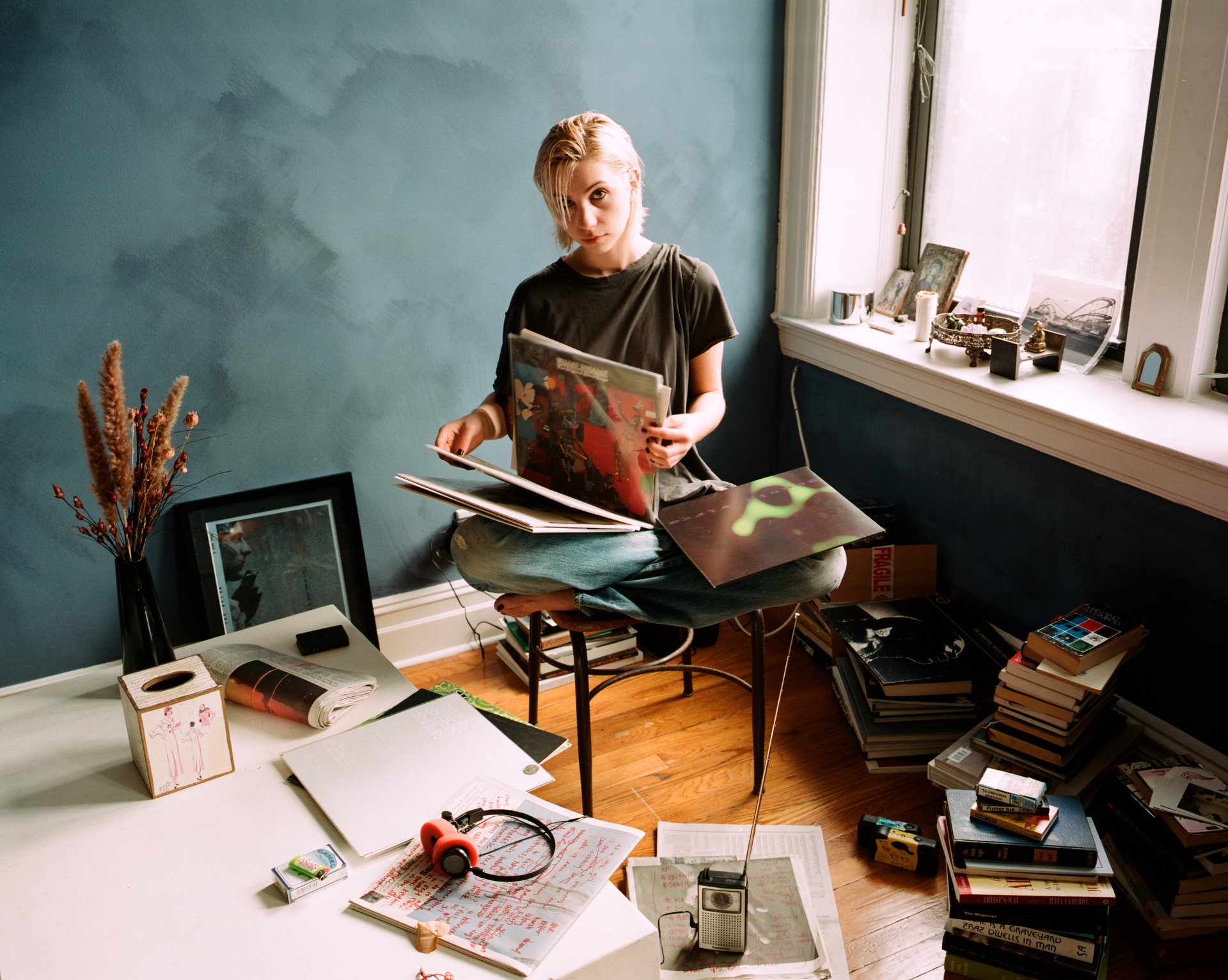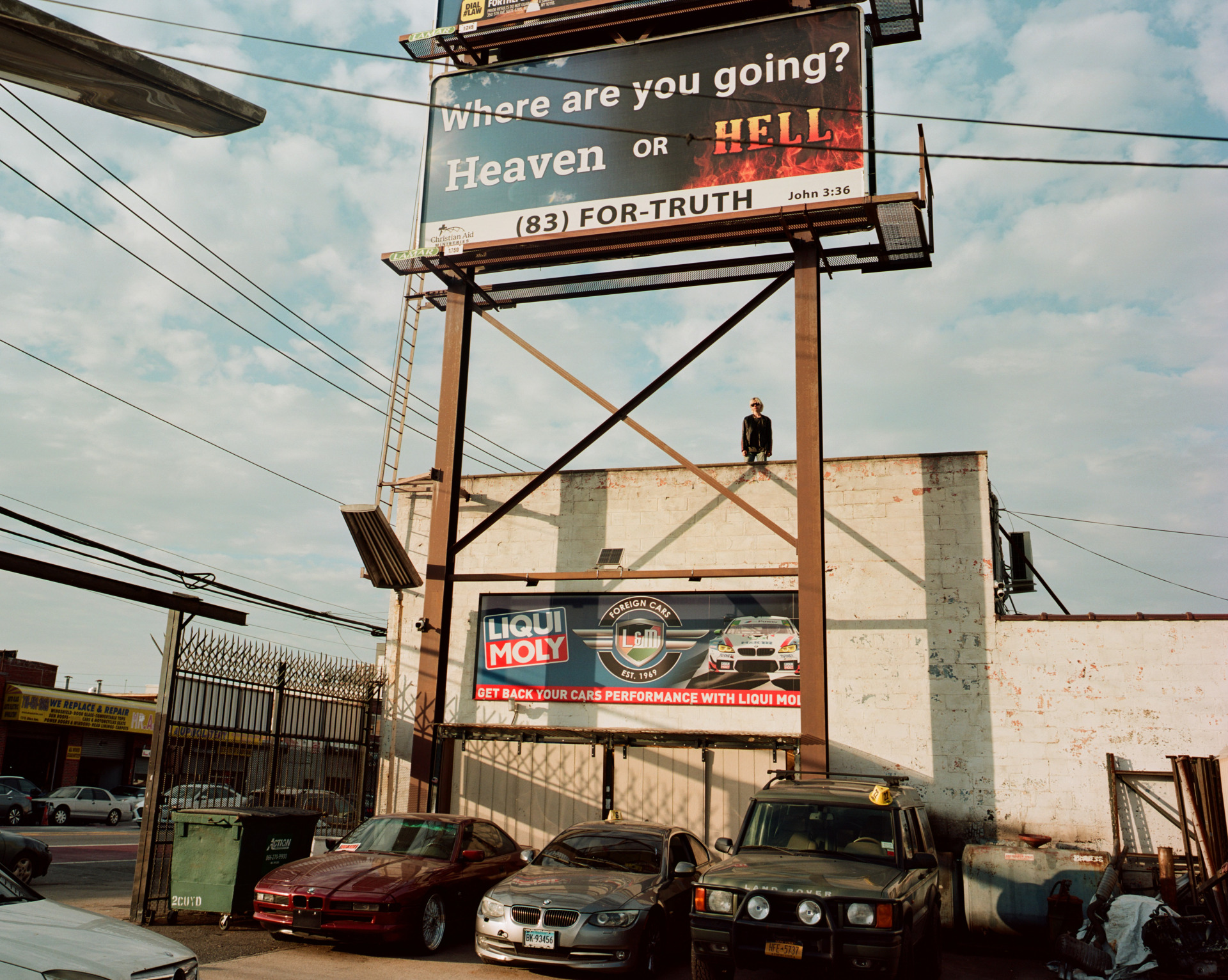Stella Rose appears in our Winter 2023 Issue with cover stars Green Day, 070 Shake, Militarie Gun, and Arlo Parks. Head to the AP Shop to grab a copy.
Stella Rose Gahan has a new ritual. She retrieves a heavy tome called The Book of Symbols from her library. The front of the 800-page hardcover features a carved crystal hand. “Every morning I’m going to put my hand on it, say the date, and set some sort of intention for that day,” she explains. “I put my energy and thoughts into it, open it up, and whatever I open up to, I have to write a little poem about it.” Today, she opened to “Spinning and Weaving,” which includes: “In all myth, the art of weaving originated in the divine world, and this is why some small mistake must be woven into the pattern, to remind us of the imperfection created in life.”
Read more: Bandsplain’s Yasi Salek will always be a teen at heart
“It weirdly connected to a lot of stuff I saw yesterday,” Gahan goes on. “I felt inspired from the show.” Last night, she attended a poetry reading and performance of her favorite artist, PJ Harvey, at the Brooklyn venue Warsaw. “She talked about poetry and how people weave things into their life using it. And if there’s a mistake, it shows, like the mistakes in life. You just don’t redo it. That’s part of life.”
In May 2023, Gahan released her debut album, Eyes of Glass, a wide-ranging rock record, an unflinching triangulation of her spirit, a hurricane of genre-bending force both utterly new and subtly familiar. “Clean” takes influence from PJ Harvey herself. The song winds around a Radiohead-like drum groove and a pedal bass pulse, until a subtle chord shift breaks the clouds open. “Oh breathе deep, we’re easing/Caution in play/Get clean, it’s never easy,” she sings. It’s a tense moment that blooms into expansive, full-spectrum relief.
On the other hand, the devastating album opener twists the knife on codependency. As the Johnny Cash-inspired “Maid” builds and breaks apart, it becomes evident the protagonist (in this case Gahan herself) is not the person they once imagined. In hindsight, Gahan continues to find herself in songs she’s already written and recorded. “It feels more like I’m the ‘Muddled Man,’” she reflects, referring to her song of the same name. “I started by asking, ‘Was I being a chameleon trying to embody some expectation?’ But it ended up being about my actions being erratic or unfair.
“I think the meaning of a song is not finished, even when you finish it,” she continues. “I think the meaning of songs can evolve with you, and that’s how you can sing them hundreds of times throughout your life. That’s the hope, that the songs evolve. You want that timeless aspect of it.”
What Gahan’s songs have in common is a total command — of attention, of tonality, and especially of playing with contrasts and expectations. As Eyes of Glass goes on, Gahan feels like less of a singer and more of a magician. Both between and inside the tracks, she demonstrates a shocking range, not only tonally but also in approach. She croons, she screams, she cries, she howls, she moans — she yearns, and perhaps that is the unifying conduit of her sound. So her personal growth goes hand in hand. “I feel like my attempt at making music is really from a place that I’m just trying to find myself, more and more,” she says. The tumult of Eyes of Glass comes from a true-to-life desire to find solace in the shitstorm. “It feels cohesive to me because it’s my experience.”

At this point, however, she’s reevaluating her approach, obsessing over new demos, and drawing influence mostly from books and film (the cameo of Nick Cave and The Bad Seeds in Wim Wenders’ Wings of Desire is a recent touchstone). “I am dying to learn new information,” she says. “I don’t want to be stagnant, and I feel slightly stuck in this version of myself. Especially now that I’m writing new music, I don’t want to repeat myself.”
She parted ways with her New York-based band, the Dead Language, earlier this year. “I want to tone it down,” she says. Gahan wonders if the next phase of her career might be more akin to folk or hymnals, rather than shredding guitars — what is the potential for her as a performer? The conversation leads to a reflection on the Chelsea Wolfe B-side “Flatlands,” an eerie, if not completely moving, acoustic track. “The main reason I’m attracted to that idea is because I feel like in music right now, there’s not a lot of space, sonically, at all,” she says.
More than that, she hopes to open a broader range of themes. “Music can be really selfish in a good and bad way,” she says. “But it’s not about you; it’s not about me. It’s about the message.” She recalls The Book of Symbols. “I’m attracted to meaning right now. It sounds obvious, but I do think there’s a lack of meaning with a lot of art that’s being made right now. What I’m feeling is that the perspective is in the wrong direction.”

Gahan starts describing tactile qualities, and then literally textiles: wool, silk, canvas, burlap. With more to literally grasp onto, she hopes to maintain the energy of her band, but in the purview of a stripped-down, solo approach. “Even with clothes,” she starts tugging at the lapels of her brown, corduroy blazer, “having less, and wearing things that are my stuff I’ve worn for a long time. It’s comforting because I know it.”
Gahan continues to realize how important it is to play. “I was lucky that in my household, everyone was into art and really creative,” she says. “It’s a little chaotic, but there is that childlike mentality always. That is the biggest thing I’ve learned from people that are older than me. That’s the way you have to lead your life, having that curiosity, like a kid. If you lose that, I don’t know… Things get way too serious.
“Having the reminder of that playful curiosity, it brings things away from getting pretentious. Having fun is really underrated. Let’s just have a fucking good time.”

At 24, Gahan has the luxury of wide-ranging wisdom, both musical and literary. It also helps to have her father, Depeche Mode’s David Gahan, as a sounding board. She plays him demos, and he plays her new work as well. As time has gone on, her appreciation for the new-wave icons has grown from a de facto parental embarrassment — “It almost felt like I wasn’t allowed to like it, because it’s my dad,” she says — to an appreciation of a deeper variety, related to Gahan Sr.’s artistic conviction. “I had a moment where I was like, ‘I’m really proud of my dad.’”
She adds that she inherited her dad’s stage manner as much as her work ethic. “Without realizing, I adapted a lot of his moves onstage,” she says, recalling a recent Madison Square Garden show. “But it’s really cool to have someone to talk to who is supportive. Not everyone has that kind of support.”

Beyond that, the native New Yorker understands the slog necessary for an artistically respectable career. She’s putting in the rounds in the NYC club scene and understands that fame is a side effect of a successful project, not vice versa. She reflects on Depeche Mode’s modest and shocking debut to the world renown they enjoy today. “I think now they’re just starting to reap the benefits of their legendary status,” she says. “People are really accepting them into that realm. But that’s after a fucking lifetime career. It’s hopeful and instructive. You just gotta keep doing what you’re doing.”
And in that, she strives for the most salient themes, which also are some of the most well trod. “It really is that simple,” she shares. “Humans are attracted to the same things they’ve always been attracted to. It’s just living in a city. With all these distractions, it’s always hard to remember that it’s good to walk on some grass.”
How does that feel when you do?
“It’s nice,” Gahan replies. “But you don’t know you need that. And it’s been there the whole time.”










